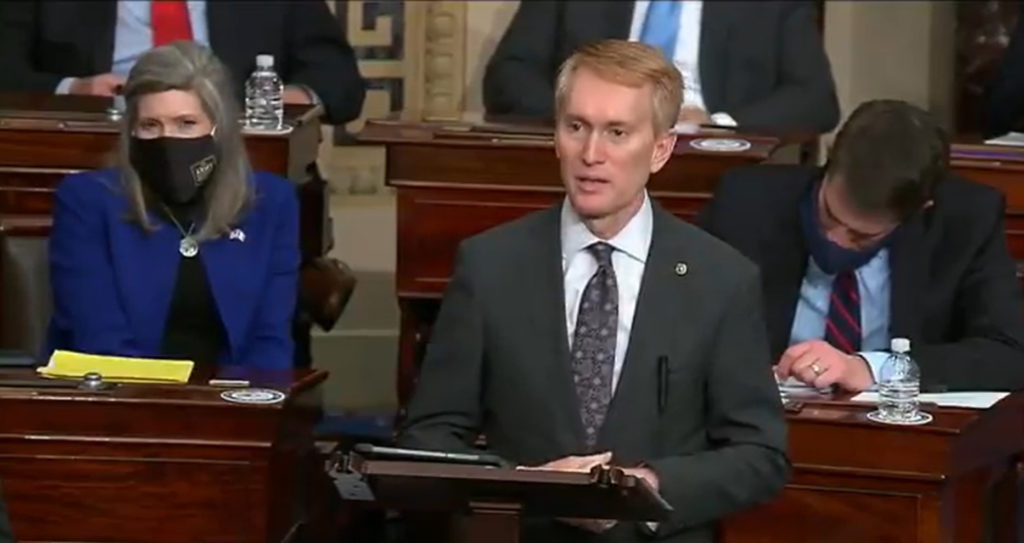
WASHINGTON (BP) – The U.S. Senate and House of Representatives both approved Friday (Feb. 5) a budget resolution that paves the way for enactment of President Biden’s proposed $1.9 trillion COVID-19 relief package.
The measure’s early morning passage in the Senate – decided 51-50 by the tie-breaking vote of Vice President Kamala Harris in a chamber equally divided between Democrats and Republicans – followed what is known as a “vote-a-rama” on 40 proposed amendments or motions. Among the amendments considered were proposals regarding abortion and religious freedom favored by many Southern Baptists and other evangelical Christians.
The Democratic-controlled House voted 219-209 later Friday for the resolution, setting the stage for its committees to begin writing the actual relief and stimulus legislation.
During the overnight “vote-a-rama,” the Senate rejected an amendment by Sen. Ben Sasse, R-Neb., that requires a baby that survives an abortion or attempted abortion to receive the same degree of care offered any other child born alive at the same point in gestation. The roll call was 52-48 for Sasse’s amendment, but it required 60 votes.
Senators, however, approved an amendment by Sen. James Lankford, R-Okla., designed to provide the same level of treatment for churches and other religious bodies as secular entities regarding restrictions imposed during the COVID-19 pandemic. The vote was 51-49 in a roll call requiring only a majority for passage.
The Southern Baptist Ethics & Religious Liberty Commission (ERLC) is grateful to Sasse and Lankford “for keeping issues regarding the sanctity of human life and religious freedom front of mind and in the conversation,” said Travis Wussow, the entity’s general counsel and vice president for public policy.
“We will continue to advocate for the bipartisan passage of the Born-Alive Abortion Survivors Protection Act in this Congress,” Wussow said. “And as the pandemic continues, we will continue to advocate that the religious freedom rights of churches and ministries be upheld and respected. These policies are as common sense as they are critically needed.”
Sasse’s amendment was based on his Born-Alive Abortion Survivors Protection Act, which he first introduced in 2015. Democratic Sens. Robert Casey of Pennsylvania and Joe Manchin of West Virginia joined all the Republicans in voting for the amendment.
“There’s a lot of complicated debates in this chamber, but this isn’t actually one of them,” Sasse told the Senate before the vote. “Here’s a chance for 100 Senators to come together and support every baby. Every baby deserves a fighting chance.”
Lankford’s amendment addressed a plight churches and other religious bodies have experienced in some cities and states during the pandemic. Government officials have sometimes imposed limitations on religious gatherings that they have not on such businesses as restaurants and retail stores. Manchin was the lone Democrat to support the proposal.
“Unequal treatment is wrong, especially when that treatment violates our Constitutional protections,” Lankford said in a written statement. “This shouldn’t be controversial. We can have the same rules for everyone – no matter if you are praying in a church, mosque or synagogue or shopping in a store.”
In other votes, senators:
- Defeated in a 50-50 roll call an amendment by Sen. Mike Lee, R-Utah, to ban the infringement of the free exercise of religion.
- Approved 97-3 an amendment by Sen. James Inhofe, R-Okla., to maintain Jerusalem as the location of the United States’ Embassy in Israel.
In addition, senators passed by voice vote an amendment from Sen. Jodi Ernst, R-Iowa, to prohibit an increase in the minimum wage during the pandemic. Biden has proposed an increase to $15 an hour.
The amendments are not binding, but the process gave Republicans an opportunity to put Democrats on the record regarding some divisive issues.
Democrats adopted an infrequently used parliamentary maneuver known as “budget reconciliation” to make possible the passage of Biden’s pandemic stimulus proposal. The procedure prevented the Democrats from needing the normal 60 votes to invoke cloture and halt a filibuster. In the budget reconciliation process, only a majority is required for passage.
Biden and congressional Democrats have called for a huge stimulus, while Republicans have contended the massive package is unnecessary because much of the money from previous relief bills remains unspent.
The most recent relief package, which amounted to $900 billion, gained President Trump’s signature in late December. It provided direct payments of $600 to each American, a cap of $300 above the standard deduction for charitable giving and $284 billion for the Paycheck Protection Program to help employee retention by small businesses, including churches.















